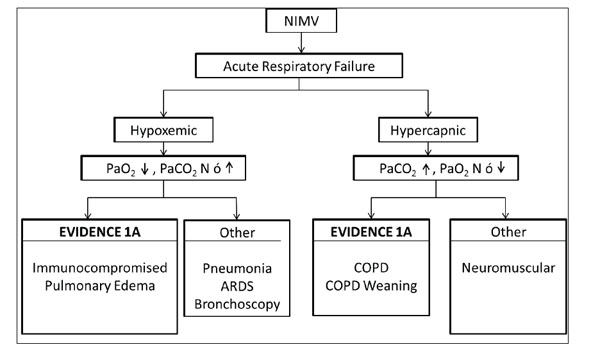
Pathophysiology Of Chronic Respiratory Failure. Hypercapnic respiratory failure may be the result of mechanical defects central nervous system depression imbalance of energy demands and supplies and or adaptation of central controllers. However hypoxaemic normocapnic or hypocapnic rf due to the failure in gas exchange is very common and should be separated from mechanical rf. Clinical findings in patients with respiratory failure typically include dyspnea impaired mental status cyanosis and headache. Renal compensation abg will show hypoxemia hypercapnia increased bicarbonate and ph usually above 7 35.

Clinical findings in patients with respiratory failure typically include dyspnea impaired mental status cyanosis and headache. Renal compensation abg will show hypoxemia hypercapnia increased bicarbonate and ph usually above 7 35. Common causes of hypercapnic hypoxemic respiratory failure include central nervous system depression diseases of the respiratory muscles and chronic obstructive pulmonary disease copd. When it does it is called chronic respiratory failure. A buildup of carbon dioxide in your blood can cause damage to your organs. Although acute respiratory failure is characterized by life threatening derangements in arterial blood gases and acid base status the manifestations of chronic respiratory failure are less dramatic and may not be as readily apparent.
A buildup of carbon dioxide in your blood can cause damage to your organs.
It is normally seen in patients who have pre existing respiratory disorders like copd chronic respiratory acidosis stimulates kidneys to reabsorb bicarbonate for compensation and keeps the ph near normal. Symptoms include shortness of breath or feeling like you can t get enough air fatigue extreme tiredness an inability to exercise as you did before and sleepiness. Respiratory failure rf is defined as a disturbance in gas exchange in the respiratory system which produces in arterial bga a pao 2 60 mmhg hypoxaemia and or a paco 2 50 mmhg hypercapnia. Crf is a long term condition that happens when your lungs cannot get enough oxygen into your blood. When it does it is called chronic respiratory failure. Although acute respiratory failure is characterized by life threatening derangements in arterial blood gases and acid base status the manifestations of chronic respiratory failure are less dramatic and may not be as readily apparent.